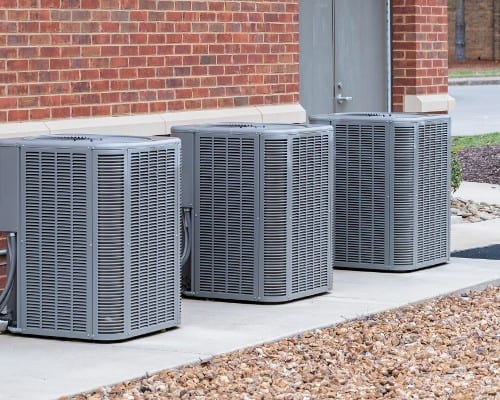Are you hearing strange noises from your air conditioning unit, or has it stopped functioning altogether?
You might be dealing with a bad AC contactor. This is a crucial component of your system and if it malfunctions, it can cause several issues ranging from annoying humming sounds to complete shutdowns.
In this guide, we’ll look at the top symptoms of a malfunctioning AC unit so that you can spot them before they escalate into larger problems. We even included a few popular FAQs for more information on how to care for your system.
Bad AC Contactor Symptoms
An AC contactor is an essential component of your AC unit. If your air conditioner unit isn’t working correctly, here are a few signs it may be an issue with the contactor.
1. Humming or Buzzing Noise from AC Contactor
A humming or buzzing noise from your AC unit can signal trouble. This sound often implies an electrical malfunction, specifically within the contactor. The culprit could be a weak magnetic coil, leading to a constant buzzing that you may just mistake for regular operation.
Loose panel bolts on your unit might also contribute to this disturbing hum, causing unnecessary worry about your AC’s health. Humming or buzzing could also indicate something more serious such as a broken relay switch or faulty contactor – well-known symptoms of a problematic AC system.
If you notice your unit buzzing, don’t ignore it as these sounds generally indicate an issue that requires immediate attention.
2. Chattering Noise from AC Contactor
When homeowners are wondering how to tell if an AC contactor is bad, we often ask if their system is making humming or chattering noises.
Chattering noises from an AC contactor isn’t just a minor inconvenience; it is often a clear sign of a faulty component. This symptom can be caused by constant vibrations in the electromechanical components or loose electrical connections within your air conditioning system.
These incessant rattling sounds can be loud and are typically more noticeable as your system starts up.
Regular maintenance is crucial to avoid this problem and ensure smooth operation. A series of quick checks on elements like wiring for signs of wear and tear could point out early warning signs to keep the issue from getting worse.
In some cases, resetting the AC contactor might resolve these noise issues temporarily. However, it’s important to note that troubleshooting an AC contactor should ideally involve professional assistance for safety reasons and to extend your system’s lifespan.
3. Pitting or Excessive Charring on Contactor
Third on our list of bad AC contactor symptoms is pitting or charring on contacts. Heavy air conditioner use can lead to pitting or excessive charring on contacts. This deterioration can often be a sign of a faulty contactor. When this happens, you may notice discoloration and erosion around the metal coils, plunger, and contacts.
With increased wear and tear, these components can loosen over time, leading to disruptive noises like humming or chattering from your unit (As mentioned above). In severe instances with more corrosion and degradation, the air conditioner may fail to start up despite a thermostat click which is a common indication your AC is starting up.
Ultimately if you notice this, it can be traced back to a defective contactor affecting communication between these vital parts of your system.
4. AC Condenser Unit Doesn’t Turn On
A common symptom of a malfunctioning AC contactor is when the condenser unit doesn’t turn on. This can happen if the contactor fails to make proper electrical connections, preventing power from reaching the unit.
It could also be due to a failed capacitor or contactor itself. If you’re experiencing this issue, it’s important to troubleshoot and address it promptly to ensure your AC system can cool your home, and to prevent any further damage to your system.
If Your AC Contactor isn’t Working Well, Call a Professional
If you notice any of the bad AC contactor symptoms we’ve mentioned, it’s good to take action as soon as possible. Contacting a professional technician to inspect and troubleshoot your air conditioner will ensure any issues are identified and resolved quickly. Ultimately this can save you costly repairs or replacement expenses in the process.
Consulting an experienced technician is the best way to get any issues with your air conditioner diagnosed and solved. HVAC technicians like the ones here at River Valley have the necessary knowledge and expertise to quickly spot problems and offer effective solutions.
Ignoring the problem or trying to fix it yourself, could only result in further system damage and more expensive repairs. Getting professional help for a bad AC contractor can save you both time and money.
Experienced technicians understand how to safely manage complex electrical systems so your air conditioning unit stays in optimal condition for as long as possible.
The Team Here at River Valley is Happy to Help.
It’s important to recognize the signs and symptoms of a bad AC contactor so you can prevent damage to your AC system. If you hear humming or buzzing, chattering sounds, if your condenser unit does not switch on correctly, or if you notice pitting or excessive charring on contacts, contact a professional for help.
Addressing these issues quickly helps keep your AC unit running smoothly and efficiently. When it comes to your home cooling system, it’s best to leave it to the experts like the ones here at River Valley.
With decades of experience in servicing our community, our River Valley technicians can offer you an accurate diagnosis, reliable repairs and preventive maintenance plans to keep your system running well.
Book an appointment with our team today.
Some related FAQs
1. Can a bad AC contactor on my AC unit cause my air conditioner to stop working completely?
Yes, a failing AC contactor could cause your air conditioner to stop working. The contactor controls the electrical current that powers the compressor and fan motors, so a malfunction could prevent your AC from turning on or remaining running for long.
2. How can I test if my AC contactor is functioning properly?
Testing an AC contactor requires careful handling as it deals with live electrical components. Therefore it is advisable to seek the advice of a qualified HVAC technician, as a professional will be equipped with all of the tools and knowledge necessary for safely testing and replacing faulty parts.
3. Can I replace an AC contactor myself?
While individuals with sufficient knowledge and experience in electrical work could do it themselves, due to safety concerns associated with working with high-voltage systems, we recommend contacting a professional technician to replace an old AC contactor. A licensed HVAC technician is trained to properly diagnose and fix any problems with your cooling system.

